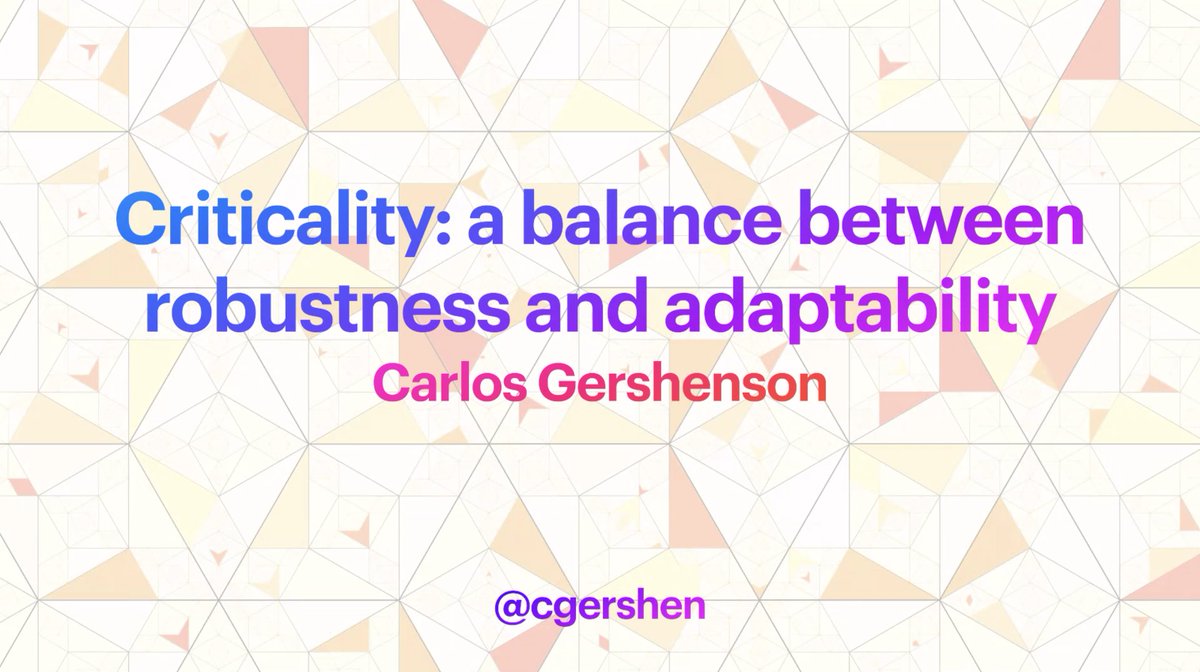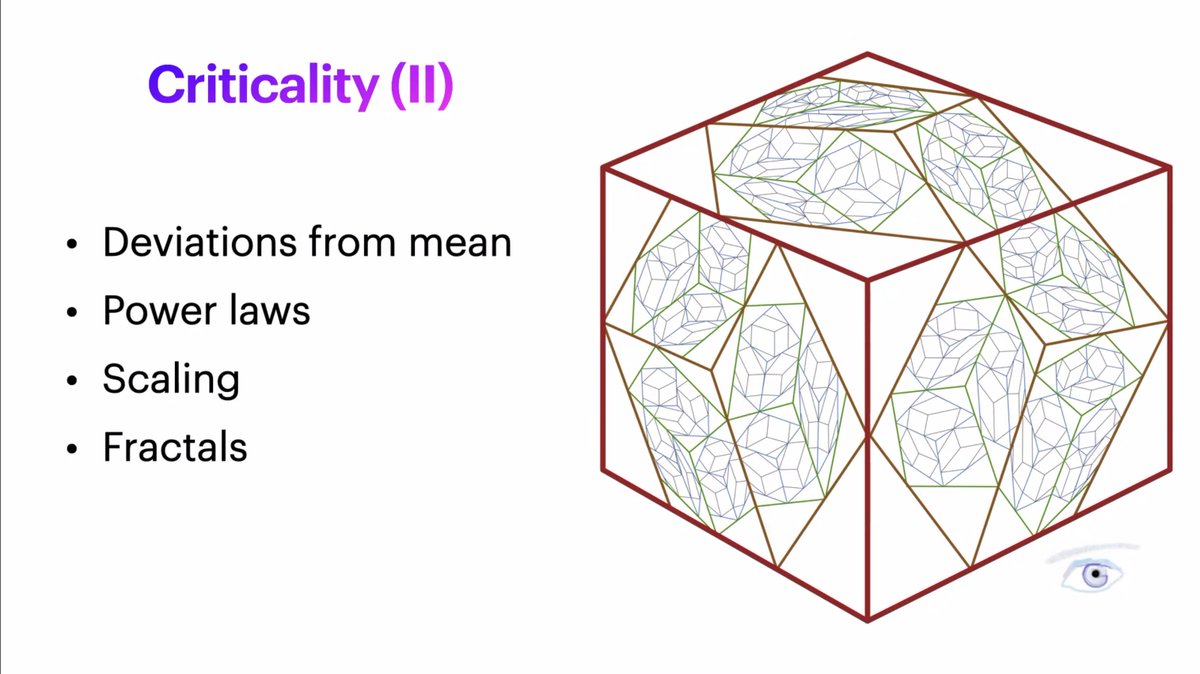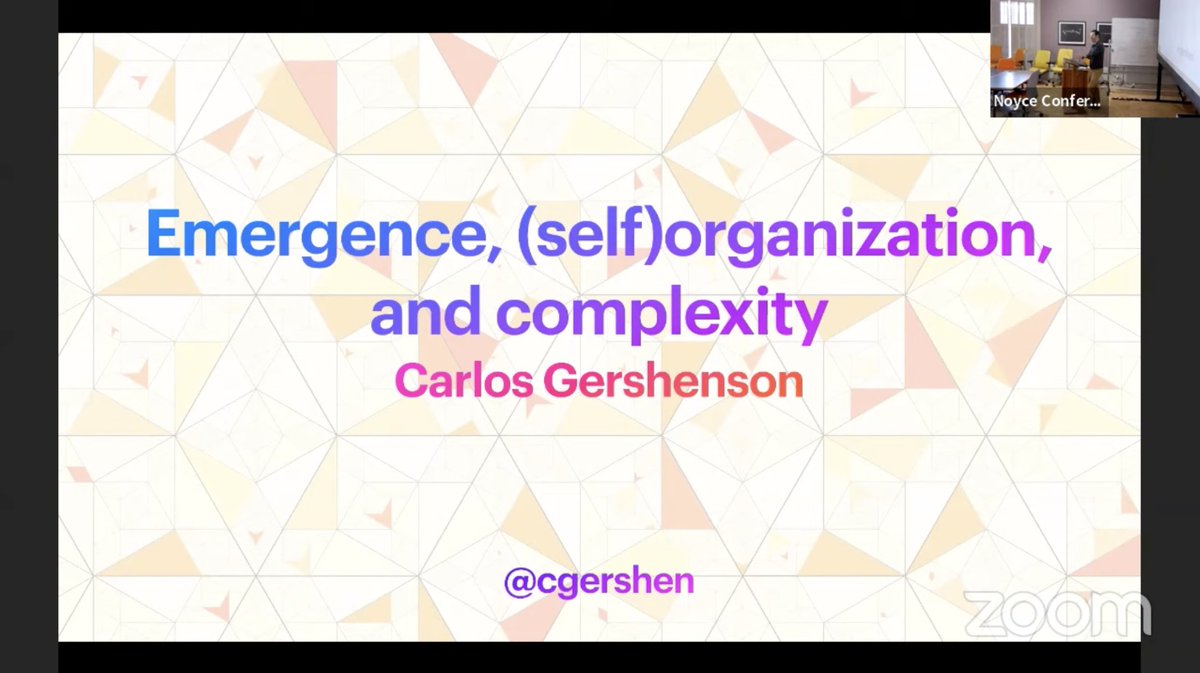
🧵 "#Criticality: A Balance Between #Robustness and #Adaptability"
Today's SFI Seminar by @cgershen @cgg_mx:

Today's SFI Seminar by @cgershen @cgg_mx:

Regarding systems at the #EdgeOfChaos
Identifying #PhaseTransition dynamics
Citing @WagnerEvolution on #Robustness
Contrasting it with #Chaos (fragile, hard to predict, etc.)
And then #Criticality, somewhere in the middle...



Identifying #PhaseTransition dynamics
Citing @WagnerEvolution on #Robustness
Contrasting it with #Chaos (fragile, hard to predict, etc.)
And then #Criticality, somewhere in the middle...




With #criticality, due to #PowerLaw(-like) distributions:
"Most of the changes will be small, but for some, you can have large changes."
See also #fractals
Key history point: Stuart Kauffman's #random #Boolean #networks (1969!)
Updated by @cgershen in 2004



"Most of the changes will be small, but for some, you can have large changes."
See also #fractals
Key history point: Stuart Kauffman's #random #Boolean #networks (1969!)
Updated by @cgershen in 2004




1. "If you have additional inputs, this scales exponentially."
2. "But since it's finite, these systems are deterministic. You have point attractors or cycle attractors."
3. "You can identify three different regimes by changing average connectivity..."


2. "But since it's finite, these systems are deterministic. You have point attractors or cycle attractors."
3. "You can identify three different regimes by changing average connectivity..."



"If #criticality has all of these advantages, how can we evolve it or exploit it, design it?"
"The more #connections you have, the easier it is for #perturbations to spread across the #network."
(See also #epidemics)
Relevance of topology to #attractor formation:



"The more #connections you have, the easier it is for #perturbations to spread across the #network."
(See also #epidemics)
Relevance of topology to #attractor formation:




Re: the #evolution of #modularity,
"You can have #networks you would expect to have chaotic dynamics but because of the modular nature the perturbations do not spread so much."
Re: #redundancy,
"This prevents the propagation of #mutations."
#Degeneracy promotes #robustness


"You can have #networks you would expect to have chaotic dynamics but because of the modular nature the perturbations do not spread so much."
Re: #redundancy,
"This prevents the propagation of #mutations."
#Degeneracy promotes #robustness



"#Antifragility is a property of #systems to benefit from #noise...they function better if you have noise."
"(Of course, if you have TOO MUCH #perturbation, you have #chaotic dynamics...)"
"(Of course, if you have TOO MUCH #perturbation, you have #chaotic dynamics...)"

"It was already known that if you have #heterogeneity, this favors #criticality. We explored the temporal structure of heterogeneity...these curves are a measure of #complexity that measures #ShannonInformation." 

"It's not like I have to choose between modularity and heterogeneity, but they all start adding up. So it seems that criticality is much easier to find than we first thought in our homogeneous models..."
"Sometimes the phase transition will move by itself."
"Sometimes the phase transition will move by itself."

"Psychology was doing complex systems BEFORE complex systems [science]."
- @cgershen
- @cgershen
"I think the things that #complexity is doing will be absorbed by other fields in a few decades and just become '#science.'"
- @cgershen
- @cgershen
(Actual end of thread accidentally appended upstream:
https://twitter.com/sfiscience/status/1598055452033830912)
• • •
Missing some Tweet in this thread? You can try to
force a refresh






























